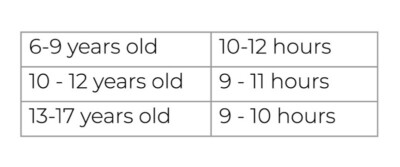 Is Your Big Kid Getting Enough Sleep?
Is Your Big Kid Getting Enough Sleep?
Once our babies start sleeping through the night, we stop worrying about their sleep and move on to the next parenting challenge. But we need to foster and protect healthy sleep for our big kids too. The CDC reports that between 60 – 70 % of kids, age 9 and up, are not getting the minimum recommended amount of sleep.
It often feels like there aren’t enough hours in the day for this amount of sleep. To make it happen, we have to reprioritize and create more structure. It will be worth the trouble.
What’s At Stake?
There are long term consequences to a chronic sleep deficit. And even one hour less than optimal can have a big effect on health.
Poor sleep causes significant impairment in memory, cognitive functioning, reaction time, hormone regulation and is associated with depression and anxiety. Sleep strengthens the immune system, promotes tissue and bone repair, and regulates mood and emotions.
Poor sleep in adults can lead to heart disease, elevated blood pressure, diabetes, obesity, and mood disorders. So we want to make sure that we instil healthy sleep habits to support our kids into their adulthood.
Recommended Hours of Sleep, By Age
 Generated with data from the Johns Hopkins Medicine, Canadian Sleep Society and The National Sleep Foundation
Generated with data from the Johns Hopkins Medicine, Canadian Sleep Society and The National Sleep Foundation
What can you do?
No Screens Before Bed
We know that the light from screens inhibits the production of melatonin, making it difficult to fall asleep. Finish screen viewing at least one hour before bedtime, though kids who are more sensitive to the light may need to stop sooner.
Social media, video games, and most other tech activities prevent the calming of the mind that is necessary to prepare for sleep.
Ban Tech From The Bedroom
It’s just too tempting, plus there’s always a risk that devices will light up or sound their notifications throughout the night. It’s a good idea for us all to follow this rule!
Don’t Ditch The Bedtime Routine
We all need to wind down before bedtime. We lead busy lives, full of all kinds of experiences, stimuli, emotions and often stress. Encourage your kids to choose a few activities that help them relax. Besides the basics, they could include mindfulness practice, reading in bed, or drawing.
Keep it consistent. Our physiology actually responds to regularity.
A bedtime routine for big kids is usually around 30 minutes, and it takes place before the actual bedtime in order to protect the hours of sleep they need.
The Tuck-in Check-in
Be there with your kids when they’re going to bed. Just because they can put themselves to bed doesn’t mean they should. This is a great opportunity to connect and check-in with them. Help them to decompress from the day and prepare for the next.
Even teens can feel vulnerable at bedtime. It may be one of the few moments in the day when they are alone with their thoughts, given the almost constant use of technology. Your presence can help them make the transition by providing a chance to talk about feelings or just giving some loving care. Build this into the bedtime routine.
The Morning Check-in
Mornings are rushed for most of us, so we miss the chance to ask about our kids’ sleep. Build in a few minutes to ask questions like, How did you fall asleep? What was your sleep like? Did you wake up in the night? How long were you awake? What were you thinking about? How were you feeling? How did you fall back to sleep?
It doesn’t have to be an interrogation. Choose a couple relevant questions so you can take action if chronic problems arise.
Exercise
Studies show that getting 30 minutes a day of moderate aerobic exercise improves our ability to fall asleep and the quality of our sleep. This is true for kids too and should be incorporated into everyone’s daily schedule.
Consider The Sleep Environment
People sleep better in a cool, dark and quiet room. I recommend black-out curtains and a white noise machine to mask household or street noise.
Make sure your child has the right pillow for their favoured sleeping position.
And how about a messy room? For some people, a physical mess can feel like clutter in the mind – those people actually sleep better when their bedroom is tidy.
Address Medical Concerns
When your kids are getting the recommended number of hours of sleep but they still don’t feel rested, it’s time to visit the doctor. Excessive sleepiness or fatigue are important symptoms to investigate and can point to a variety of different conditions. For example: even skinny kids, who don’t snore, can have sleep apnea, as I discovered with my 13 year old.
Tend To Teen Sleep
It’s common to think that teens need the same amount of sleep as adults – but new research shows they need more because they’re in a second developmental stage of cognitive maturation and physical growth spurts. More sleep also helps protect them from depression and other states that can lead to drug use.
Teenagers experience a natural phase delay in their circadian rhythm, so it’s understandable that they will want to go to bed later. However most high schools have not made the move to later start times. If your teen needs to wake by 7:00 AM to get to school on time, bedtime should be 9:00 PM. Make sure they see bright daylight, at waking, to reset their clock. Alternatively, teens may decide to have an afternoon nap and a later bedtime.
Teens who aren’t getting adequate sleep should not be allowed to drive a car. Driving drowsy is like driving drunk. Of course, this goes for all of us!
Teens are particularly susceptible to sleep-onset insomnia caused by anxiety. Cognitive behavioural therapy and mindfulness practice can be effective treatments. A visit to the doctor may be warranted.
Have A Family Sleep Meeting
We have to educate our kids on the importance of sleep so they can appreciate new initiatives like earlier bedtimes and cutting-off screen time. Share with each other how bad it feels to be over-tired. Give them real facts about the dangers of not getting enough sleep. Many kids will rally to the cause and get excited about prioritizing sleep.
Those of us with kids who resist, have to create clear guidelines with firm boundaries. It’s not easy for our kids to make these healthy choices for themselves. Staying up late shouldn’t be an option for them, just like cake for supper is not usually an option.
Parents will often reward kids or try to create fun by offering late bedtimes. Done occasionally, it’s not a problem. But there are healthier and more substantial ways to celebrate. Have kids take part in a brainstorming session to find alternatives.
Talk about ideal bedtime routines and make posters or lists. Discuss how to make a new schedule work.
Most of us could use some work on our own sleep hygiene. During the meeting, identify changes you’ll be making for yourself, so that the whole family is taking on the project of prioritizing sleep together.
